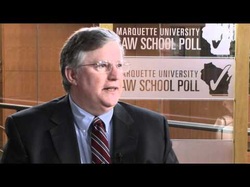
"Polling is merely an instrument for gauging public opinion. When a president or any other leader pays attention to poll results, he is, in effect, paying attention to the views of the people. Any other interpretation is nonsense," so stated George Gallup, a pioneer in the American polling industry.
Charles Franklin seems to agree. Franklin, a visiting professor at Marquette University and co-founder of Pollster.com has been in the polling field for years, working on national and local elections, as well as with private polling.
Currently working on the politically independent Marquette Law School Poll, Franklin is developing questions and polling techniques to shed light on the heartbeat of Wisconsin politics in this election year.
In speaking with my journalism class this afternoon, Franklin spoke of his work in policy polling and the implications of the latest round of law school polling. Calling political polling the latest form of beat journalism, Franklin echoed Gallup's words, stating that while with every political poll "at least one party will be unhappy with the results and contest it [for the most part] pollsters and political counterparts want fair and non-biased polling, because otherwise it wouldn't do much good."
In order to create as impartial a poll as possible in order to return the most accurate results, Franklin forms specifically worded questions and uses creative statistical analysis in interpreting the results. With the creation of Pollster.com, polls were viewed in the aggregate to learn of polling trends instead of relying solely on the latest poll to indicate the country's mood. Franklin said that aggregating polls prevents using "grossly misleading polling data," by looking at the trends of multiple polls.
"Aggregate polls allow [pollsters] to pull out the signal from the noise and present it in an effective way," Franklin said.
Since The Huffington Post purchased Pollster.com in 2010, Franklin has continued polling. He came to Marquette in 2011, and has been working on making the Marquette Law School Poll the premiere poll in the state. Polling is conducted about once a month concerning a wide range of issues in order to determine what is shaping public opinion. Each survey interviews 700 registered voters, chosen at random from every phone number (including cell phones) in the state.
Questions are formulated strategically to be non-partisan in nature, unlike interest group-sponsored polling, which phrases questions in ways to strategically support their case without being factually wrong in order to drive home their desired point.
The Marquette Law School poll focusses on registered voters, chosen at random from a phone bank in which every phone number in the state is eligible. About 15 percent of respondents in each poll are newly-registered voters.By using phone polling instead of online polling, the results are more statistically sound. This is because online polling is entirely based on volunteer samples and thus is not random at all-- which Franklin says is fundamental to the science of voting.
March poll results will be released next week, and I will do a follow-up blog to discuss the outcomes.
Charles Franklin seems to agree. Franklin, a visiting professor at Marquette University and co-founder of Pollster.com has been in the polling field for years, working on national and local elections, as well as with private polling.
Currently working on the politically independent Marquette Law School Poll, Franklin is developing questions and polling techniques to shed light on the heartbeat of Wisconsin politics in this election year.
In speaking with my journalism class this afternoon, Franklin spoke of his work in policy polling and the implications of the latest round of law school polling. Calling political polling the latest form of beat journalism, Franklin echoed Gallup's words, stating that while with every political poll "at least one party will be unhappy with the results and contest it [for the most part] pollsters and political counterparts want fair and non-biased polling, because otherwise it wouldn't do much good."
In order to create as impartial a poll as possible in order to return the most accurate results, Franklin forms specifically worded questions and uses creative statistical analysis in interpreting the results. With the creation of Pollster.com, polls were viewed in the aggregate to learn of polling trends instead of relying solely on the latest poll to indicate the country's mood. Franklin said that aggregating polls prevents using "grossly misleading polling data," by looking at the trends of multiple polls.
"Aggregate polls allow [pollsters] to pull out the signal from the noise and present it in an effective way," Franklin said.
Since The Huffington Post purchased Pollster.com in 2010, Franklin has continued polling. He came to Marquette in 2011, and has been working on making the Marquette Law School Poll the premiere poll in the state. Polling is conducted about once a month concerning a wide range of issues in order to determine what is shaping public opinion. Each survey interviews 700 registered voters, chosen at random from every phone number (including cell phones) in the state.
Questions are formulated strategically to be non-partisan in nature, unlike interest group-sponsored polling, which phrases questions in ways to strategically support their case without being factually wrong in order to drive home their desired point.
The Marquette Law School poll focusses on registered voters, chosen at random from a phone bank in which every phone number in the state is eligible. About 15 percent of respondents in each poll are newly-registered voters.By using phone polling instead of online polling, the results are more statistically sound. This is because online polling is entirely based on volunteer samples and thus is not random at all-- which Franklin says is fundamental to the science of voting.
March poll results will be released next week, and I will do a follow-up blog to discuss the outcomes.
 RSS Feed
RSS Feed